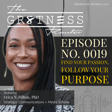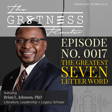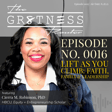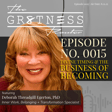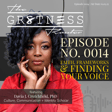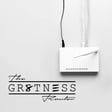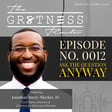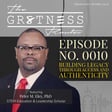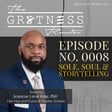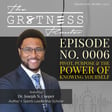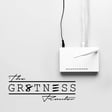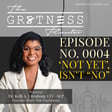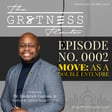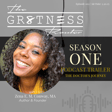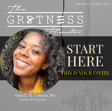Introduction to The Greatness Router
00:00:08
Speaker
This is the Greatness Router, where we connect purpose to process one conversation at a time.
00:00:23
Speaker
Welcome back, great people, to another beautiful episode of The Greatness Router.
Guest Spotlight: Dr. Ashley Gaddy Robbins
00:00:29
Speaker
Today, I have a beautiful guest that I have known since we were youngins, and it's such a beautiful experience to sit here in front of her today. I know y'all can't see her just yet, but I am seeing just the growth and the beauty of Dr. dr Gaddy our ah Robbins. like This is so beautiful.
00:00:48
Speaker
This is so beautiful. Okay, let me let me hop in. um Today's guest is a leader, a liberator, and a truth teller when it comes to people, power, and purpose.
Authentic Leadership and Empowerment
00:00:59
Speaker
Dr. Ashley Gaddy Robbins is the founder and lead consultant of Ashley Gaddy Enterprises, a DEI-centered agency that takes a deeply human and authentic approach to advancing equity and inclusion in the workplace and beyond.
00:01:16
Speaker
She's worked across higher ed, corporate sales, and telecommunications and brings that full spectrum experience into what she calls the AGE approach. A signature framework rooted in authentic leadership, inclusion, and empowerment.
00:01:34
Speaker
Her belief? that centering humanity and showing up fully and unapologetically build stronger teams and more impactful leaders. Dr. Gaddy Robbins is a native North Carolinian with degrees from UNC Wilmington and a PhD in cultural studies from George Mason University.
Living Empowerment and Authenticity
00:01:53
Speaker
Her work centers race and and gender equity, inclusive leadership and institutional transformation as a professor, strategist, wife,
00:02:04
Speaker
Mother of four beautiful daughters and proud member of Delta Sigma Theta Sorority Incorporated. She lives what she teaches, empowerment through authenticity.
00:02:15
Speaker
Dr. Ashley Gaddy Robbins, welcome to the show. How are you today? Let me tell you what, just keep that. I need to put you in my back pocket. I just need to hit play now.
00:02:28
Speaker
On that every time I walk in the house, let alone a stage. Straight like that. walk in the house. That was beautiful. Hi there, everybody. Hello. I'm so honored to be in community. The full circle moment of this is like, is wild.
00:02:46
Speaker
I'm so excited. Like, I don't think y'all understand. We grew up together, um different circles, different groups, but still the same area, same group. it I don't know. It's just been beautiful.
Impact and Challenges in DEI Work
00:03:00
Speaker
we we We split off and went to different colleges, led different lives, but still kept in contact. Always watching.
00:03:09
Speaker
You know, always like, yeah, that's my girl. Oh, you know, Ashley, yeah, that's my boo. Yeah. She crossed into into Delta land. i was just like, oh yeah, yes, yes, yes. yes that That was definitely a great addition to membership. I am here for it.
00:03:23
Speaker
And you are thriving, sis. Thank you. Thank you. I certainly appreciate it. And that feels good to hear and be reminded of because the times try to make you forget, especially kind of in the in the work I do around inclusion and authenticity.
00:03:40
Speaker
You know, what's around me tries to make me forget, but it don't win. Right. Because community is stronger. So um it just I'm just so grateful for community ah because it is really at sometimes, you know, kind of in the state that we're in, sometimes holding me together. And I'm just so appreciative.
Adaptability in DEI Approach
00:04:02
Speaker
absolutely. Absolutely. Is there anything I missed on your bio that we need to tap into before we hop into the mix of the shebang? No, I mean, God, that was so good.
00:04:15
Speaker
No, that's exactly what I do. that That's the work that I do. that's it um ah The only thing I would kind of just add is the modalities. And so I think people try to lock me in as just the DEI girl. okay But my experience ranges in so many things. I truly believe when you center humanity, you can place, you can plot me in any industry.
00:04:34
Speaker
I like it. can plot me in any conferences because the modalities can range from keynotes to trainings to strategy and development yes to executive coaching to you just need a thought partner to stay beside you. And so I think it's just also important to name the different type of ways that that folks can get the work because, know,
00:04:53
Speaker
um um It's easier for our mind to lock in in one thing. um so I just love kind of giving voice and naming all the different ways that it can go about happening. Y'all heard her. She said she's versatile.
00:05:05
Speaker
Okay. She is versatile. Okay. She says she has an app for that. Okay. That's correct. Kind of let's talk button, okay? On the website. Let's talk. Let's talk.
00:05:18
Speaker
Y'all already know. Okay. So I like to start off introducing our audience because I like to say we share an audience at this point in time. Your audience is mine and mine is yours. So welcome everyone to this conversation. Y'all are truly in for a a treat and I'm excited to to hear the knowledge that Dr. Gaddy Robbins is about to drop on us today, but we're going to start with these icebreakers. So I have a standard one and then I have a customized. So going to start with the standard one.
Unfiltered Conversation with Harriet Tubman
00:05:45
Speaker
that If you could have a candid, unfiltered conversation with any historical figure, who would it be and why?
00:05:56
Speaker
Anyone. there is So the historical is what ah switched it up mentally for me. Okay. Because i i just side note, I am just really obsessed right now with Ryan Coogler. Okay. I went to go see him this weekend. And I've just been, I've been just watching countless interviews and conversations with him and his mind is just so vast. I'm just so into that.
00:06:22
Speaker
But historical, for real, for real, Harriet Tubman, pull up. Because here's what I want to know. I need to know how they was really acting. I need to know who was saying about, I wanted to know, I want to know the excuses that you heard.
00:06:35
Speaker
i wanted to know how you put fire behind they behind. I wanted to know, I want to know at what point did you, was you just like F it? You know what I'm saying? Like, tell me all the things. There was this video that went around um when people ask about like, how was the funeral? They're like, the funeral? It's like, no, because I need to know who was acting up.
00:06:55
Speaker
I need to know who brought the food. I cannot. Because that's just who we like. We need to know the details. We need to be able to see it. So when it comes to Harriet Tubman, yes, we're talking about a time not so great.
00:07:07
Speaker
But I still need to know was going down, how they was acting. like i can I can only imagine how excuses was working then. You know what I'm saying? I am so tickled. It's less about kind of the things we already know. I try i want to i want to know what you heard the dark. I need the background. I need the background information. I need the details. Do you know what is bananas? And I'm loving this as an underlining theme for the pi the the episodes that I've actually had.
00:07:38
Speaker
But it has been. Harriet Tubman or Nat Turner. Like consistently. Yes. Yes. And, and the, the concept has been the same. Like, like bro, say yeah what were you thinking? Please run us back because what I'm dealing with right now, I know you're dealing with way more and I just need, I need the context.
00:07:57
Speaker
Yeah. I think so good. and And just seeing kind of the people who've had that align, that tracks, like that just tracks that that they would say one of those two people. I love it though. respect it. I'm going to put my name in that Harriet bucket too then.
00:08:12
Speaker
Okay. Okay. Received, received. Well, y'all heard it. Y'all y'all better go, ah go, go get a history book, go read up. You know i'm saying? Let's, let's, ah let's open the channel ways. Let's go. All right.
00:08:23
Speaker
So thank you for that.
Prioritizing Health and Protection
00:08:24
Speaker
The next one Dr. Gaddy Robbins, your work centers on authenticity and purpose. So let me ask you this.
00:08:36
Speaker
What's a value you hold today that you, Younger you would have never seen coming. Which is crazy because I can't imagine when when i when when i I concocted this question, i couldn't imagine what it would be just because you you've just always been you.
00:08:56
Speaker
yeah yeah that doesn't mean that you haven't had a journey. So I need the deets. Yeah, so um I'm so glad that that you named that because I do, without even knowing it, like I didn't know that was a value. I didn't know that was things something that people didn't do.
00:09:13
Speaker
Just like social justice, I come from a social justice family to the point where I thought everybody did it. You know what I'm saying? I thought everybody did it organized. I thought everybody was out here for justice only to find out like, oh, shoot, y'all not holding meetings?
00:09:25
Speaker
No. Okay, cool. So i look i thought like I thought authenticity was just the way of the world, but it's so not. um So here's what I will say. and this is something that I told my students just two weeks ago.
00:09:39
Speaker
I would say a value is kind of just what is priority. And what I mean by that is I realize now that cash ain't king.
00:09:51
Speaker
I was a younger me did want to push for funds. I did want to put, I mean, who doesn't, you know what I'm saying? Like I didn't want to push for cash. And now I'm realizing, and I think entrepreneurship has absolutely helped.
00:10:06
Speaker
ah out of it And also having a family has helped that cash ain't king. You know, what's king for me? Health is king. ah You know, what's king for me? Protection. You know, what's king for me? Joy and my kids. And so like, I think that,
00:10:20
Speaker
Um, although there may have been thoughts of knowing that I wanted to, you know, to, to have a partner or thoughts of maybe I want to have like one kid cause I was not trying to do nothing. And now you got four and a new one, a new one at that, right? Okay. A two year old, a 12 year old, twin 10 year olds and a two year old, all girls. You are love baby. Okay. Love. That's the way we're going to say it. am love.
00:10:47
Speaker
um But I would say that I wasn't thinking about health. I wasn't thinking about joy. i wasn't thinking about protection as a very intimate form of love.
00:10:58
Speaker
I just wanted to go get it. I was just an achiever. And so I will say that yeah I would tell younger me like, That's cool. But baby, don't make that the number one thing, because out of all out of all the things I've listed, that's the thing that's going to be the most fluid.
00:11:17
Speaker
Yeah, that's going to be the thing that's most up and down. You see what I'm saying? If you can center joy. if you can center health, if you can center the understanding and wisdom of protection as love, because again, um still not a little bit, but even more in my younger self, I wanted to know everything, when I wanted to know it, how wanted to know it. And you better give me the information because I got to know.
00:11:41
Speaker
With the neck pop, y'all. Sometimes not knowing is the thing that shows that I'm learning that from my husband all the time. He like, I didn't tell you because if I did, I know that would have triggered you.
00:11:54
Speaker
So stop being so fast and trying to know everything all the time and take protection as a form of love. I love that. i love that for you. and Oh, okay. So I'm going to like prioritize protection now and and prior by by doing so, I have to prioritize humility.
00:12:15
Speaker
Yes. And that is not a word, although in my character was practiced, is not a word that was centered. And so I would say those are probably but like that's so the head big header is what I prioritize.
00:12:30
Speaker
And underneath that is the bullet points that now now me is thinking about. I love that answer. And I love the evolution that you encountered to get to that point. Like once again, y'all, we have literally known each other.
00:12:47
Speaker
i can't say all of our lives, but say what? Is Mel Brooks? No, i didn't even go to Millbrook. We never went to school together. That's the crazy part. about it No. That's my point. I just knew we was at least in the same school. No. Actually, we never went to school together. Like, ever. You didn't go to Millbrook, Enloe, East Ghana, East Millbrook.
00:13:07
Speaker
I did go to Enloe. I graduated Enloe in 05. But I i graduated 04. Okay, so I came in. So we were at Enloe together. But we weren't at the same time. that's crazy. crazy.
00:13:21
Speaker
This is crazy, y'all. This is really wild. I think what's the wild part that we're saying, audience and community, is that it feels so close.
00:13:32
Speaker
It does. It does. For us to not be in the same vicinity. you can't tell me that we didn't grow up together because we did. Yeah. yeah and And like, this is sis, like real life, like beyond sorority. This is sis. This is like life sis. I'm here for it. I love it. I love it. um Thank you for this icebreaker, y'all. I hope that y'all are enjoying this conversation because I surely am.
00:13:55
Speaker
um Let's hop into your router moments. You know, let's let's talk about the purpose behind your work. If you could pinpoint the moment you knew what you're doing right this moment,
00:14:07
Speaker
the Ashley Gaddy Enterprises, like the work that you're doing within this, was your
Journey to Authentic Storytelling
00:14:12
Speaker
calling? What would it be? So let me kind of again, let me go back to the the the context.
00:14:21
Speaker
Social justice has been embedded in everything I do. And not just like, let me grab the megaphone, grassroots organizing, doing right by people, oh doing right for people has always been a core value in my home.
00:14:38
Speaker
i got a lifetime NAACP lifetime membership card for my 11th birthday. I was like, what kind of gift is this? But it just lets you know who my parents are right because they were like, if we all in this work, you know what I'm saying?
00:14:55
Speaker
And so I say all of that to say, um Inclusion, equity, um justice work was a part of everything that I did.
00:15:06
Speaker
um But when it became like a calling is when I trans when i was at UNCW. So I knew, i just knew I was going to be a broadcast journalist my freshman year of high school.
00:15:18
Speaker
Okay. So um when I started at Millbrook, I enrolled late or something. Something happened in transition. So I had to go to a broadcast class, but it ended up being the thing that I loved the most.
00:15:31
Speaker
But when I got to UNCW and I started kind of naming the stories that I wanted to do, folks were kind of giving me these odd looks. And I'm like, you know what? So kind of my ideal segment was taking the yellow pages at the time. Okay. Throwback. into the one And I just wanted to flip through it. And then wherever my finger landed, I wanted to call that person and say, tell me your story.
00:15:54
Speaker
Oh, my God. So i really just wanted to create spaces for storytelling, people's lives, people's experiences, people's identities, people's backgrounds. That was my ideal segment. And I wanted that segment to be on the news. And I wanted to eventually get my own show where people like we expanded on these stories.
00:16:14
Speaker
So when I started kind of telling my professors that that was what I was working towards, they were kind of like, and I was like, what what is that response that I'm feeling? What is that?
00:16:27
Speaker
um Because they're they're they're looking at me as if it's odd. Now, mind you, I'm also the only black girl in class. I you know i went to UNCW, so very predominantly white, especially in comm studies and this especially with the concentration and broadcasts.
00:16:41
Speaker
Right. So I was already like, whatever. But to to then kind of get this response, I knew it was something that was not normal for them. And so kind of when I just talk to folks, and you know, in the cultural center or when I talk to you know folks around me, also have the very, very good honor to be in community with folks who are the head of the radio stations in Wilmington.
00:17:05
Speaker
They were just like, honey, because maybe that's not normal. Like what you're doing is creating an avenue for authentic storytelling and broadcast. Unfortunately, is not steeped in authenticity as much as they want to say it is.
00:17:20
Speaker
It's not. So I knew that I had something and I knew i was called to tell, share and help folks create spaces for authenticity when I realized that it wasn't the norm, which also meant though,
00:17:38
Speaker
I had to take on the the understanding and role of being a disruptor. You did.
Career Challenges and Academic Pursuits
00:17:44
Speaker
Because I was not going to conform to what broadcast was. Wow.
00:17:50
Speaker
So I take it you didn't stay in broadcast. um I didn't even get a job outside of ah undergrad. So very quickly, which is like, I have a list of things I'm going to write.
00:18:01
Speaker
This is an article. Um, I did everything they told me I was supposed to do to get the end the outcome that they told me I would get.
00:18:13
Speaker
If I go to college and I get involved, if I graduate with honors, and with cords and stoles, if i join a sorority, if I make the Dean's List, if I work twice as hard, if I'm that girl on campus, if I get an internship, this will be the outcome, baby. You will have a job. You will be good. I did everything they told me I should do.
00:18:36
Speaker
and I had nothing at graduation. i had working at Charlotte Ruth's still part time. Oh my gosh. That was my, that was now, did I have clothes and shoes for the club? Absolutely. Every day, I ain't had no full-time job.
00:18:51
Speaker
And so I was really stuck. I was really stuck. Like what? Wait a second. Somebody lied to me. Somebody said that if I did all of these things, this would be the outcome.
00:19:05
Speaker
Ever since I was in high school, you got to study extra hard for it. You got to do it. Well, I did all that. Yep. Yep. So now what? So um I end up working at the call center.
00:19:16
Speaker
Okay. So never walked into a studio full time. Okay. I worked at a call. I had to transition to a call center because I needed to pay rent. No, I understand. And then that kind of took its own route. so so So, yeah, but still love the art and the craft.
00:19:34
Speaker
But now I get to do broadcasts, but by being the person who's being interviewed and not the reporter. So I still find myself in in studios and et cetera. Straight like that. Now you're the expert. It's so funny because I'll be micing myself up. They'll be like, how do you know how to do that? I'll be like, did y'all do a camera check? They'll be like, the guest usually doesn't notice. And I'm like, baby, don't play. If only you understood that I stood in the background just to be placed right here front and center. Exactly. Let me tell you how to...
00:20:04
Speaker
It forms an organic relationship and appreciation because they're like, so you there's more empathy because I understand what you do on the other side of the camera. And they're like, you can come back anytime because you just there is an understanding and a respect yeah yeah that they usually don't get from other guests. yeah So it really worked out.
00:20:24
Speaker
So before I hop in I think we we align a lot in the fact that, you know, we were getting we were handed a rule book. I'll say a rule book or a guideline book. And we went by, we followed those to a T. I mean, great granted, you know, we we bumped into the walls the way we needed to bump into the walls.
00:20:44
Speaker
We didn't get the response. We didn't get the end product like we were promised. And now here you are carving out the way. And I think that that's beautiful because every story you've told me thus far has been, it was supposed to be this way, but you know what?
00:21:01
Speaker
I had to turn around and carve something else out. And I think that that's beautiful. I really do. So that takes us into the pivot points. yeah And it sounds like there've been several. So I'm going to let you choose which one it was. Was there ever a time when you almost chose a different path?
00:21:16
Speaker
Yes, there was. so So now let's grat we make it through undergrad. We are working at the call center. I am still, the goal is still broadcast journalism.
00:21:29
Speaker
Okay, fair. I'm just working at the call center to get cash to pay rent to get to find out what the next step is going to be in broadcast. I'm still putting out demo reels, like everything.
00:21:43
Speaker
So ah the company has a tuition assistance program. So I said, I might as well get my master's because I'm ah i'm here. Well, she here. So you might as well do something straight like that. I'm going to pay for it.
00:21:56
Speaker
So I enrolled in the liberal studies program at UNCW, University North Carolina, Wilmington. And it is a beautiful interdisciplinary program that really focuses on the human condition.
00:22:12
Speaker
I love that. so my idea was that I'll take this master's program so that I can learn more about the ways in which people live and love and work.
00:22:23
Speaker
Everyday people, which has always been my focus. Right. So I was like, the more that I learn about people, the better interviewer I will be. That will kind of propel me into broadcast journalism. Fair.
00:22:34
Speaker
Well, um I take an everyday ethnography course. And we are doing ethnographic research with participant observations, field notes, et cetera. Basically like, you high key people watching.
00:22:47
Speaker
It's an actual research method. So if you're like, love people watching, consider master's degree, who knows? okay not it But I mean, and then, you know, probably my scholar friends would be like, it's so much more than that. It is. And you do a whole lot of people watching is all I'm saying.
00:23:03
Speaker
Like, don't let these doctor roles fool you in some of these cases. Um, it was on the city of Wilmington. Um, and so we did a concentrated area and we were all going to pick a different area in that radius and do ethnographic research. And we were going to all put it together and submit it to a conference so that we could present the paper on ethnographic research.
00:23:32
Speaker
Everybody's picking their, their things. So again, I'm still at UNCW. Now I'm in the master's program. So baby, there ain't nobody brown. I mean, not math, nothing.
00:23:43
Speaker
And y'all studying people. Okay. at least not emotional it's not my And ain't it? And so people are like, the boutique shops, the battleship, you know, the market. It's awesome, okay? Where about looking at chips ah spot around the corner? Yeah.
00:23:57
Speaker
Yeah, exactly. I said, well, want to do Castle Street because that's where my people at. Castle Street? First of all, they didn't even know what it was. So basically the the the very quick high level version is Wilmington had a very flourishing upper middle class black community, entrepreneurship, council members, et cetera.
00:24:20
Speaker
The massacres of 1898 kind of disrupted, dismantled, burned down this whole entire kind of empire. Wilmington is very segregated in the ways in which it functions and the ways in which it operates, et cetera.
00:24:35
Speaker
so And Castle Street is like two blocks over from the main downtown street that they were that they were saying that they wanted to do. Still within the radius, but not in their downtown.
00:24:47
Speaker
and this And again, i got that type of response. Well, that just seems absurd. Like, wow why would we put that in the paper? so the pivot point for me was to then focus on Blackness specifically. So although I was doing such as Justice's work and everybody would be like, girl, you everything Black,
00:25:05
Speaker
That was the pivot moment to center Blackness.
Focus on Blackness and Justice
00:25:08
Speaker
um And so it's my master's my master's thesis research that actually was the the big, big pivot point, because in then kind of only working with um Blackness at the intersections of so many other identities, I wanted to then leave the idea of broadcast journalism alone and pursue education consulting in a way that at first I thought wanted to be a full-time professor, realize what that all
00:25:37
Speaker
entails. I was like, i want I don't want to do that. And so what does that look like for me if I don't want to be tenure track? um So the major pivot point, ah so the smaller pivot point within that was kind of this shift to blackness. And then the larger pivot point was this shift outside of broadcast journalism and into education and consulting.
00:25:59
Speaker
um And so now I kind of let that path that Let that path lead me. So my academic experiences really shaped a lot for me and my path by these moments that tried to make me feel othered.
00:26:15
Speaker
Right. Yeah. ah right Wow. I'm flabbergasted. Yeah. Yeah. on On so many levels, though. Not even... Beautiful story. And I know it was not beautiful while you were going through it, but it's absolutely beautiful now because i can truly appreciate where you are at this at this stage. like We all have our journeys. We all have our paths.
00:26:38
Speaker
um But you even functioning in a space that was not... designed for you and recognizing that you were responsible for carving out space and carving out conversations and carving out opportunities for other people.
00:27:01
Speaker
um You really are a light, a beacon. Like you really are able to to think in an omni way. Like I just, I, I, I know you know this, but I don't think we, we often get told about ourselves the way we should. And and the way you're wording it, I haven't heard of it before. so I love the way you're wording it too. Sorry. yeah Well, we'll make sure you put this This omni way is so right though. This omni way is so, that is the approach.
00:27:31
Speaker
That's so spot on. No, big facts, big facts. i I love that you were able to enlighten people who didn't know they even needed to be enlightened. But at the same time, you really parted the the way for others to usher in and come through. That's so dope.
00:27:48
Speaker
That's so dope. are your flowers, sis. I appreciate that. Thank you so much. i am I am moved by it. It is definitely, um it's personal work too. So I am, um' I'm moved by it.
00:28:00
Speaker
I love it. Okay. So let's talk about your resilience and your process.
Resilience through Faith and Community
00:28:07
Speaker
What keeps you going or keeps you in the game when things are not going smoothly?
00:28:12
Speaker
Yeah. folks ask me now I'm feeling. was kind of, again, with the political climate, et cetera, that that we're in. and um,
00:28:24
Speaker
There's a line in Hamilton the musical ah where Lin-Manuel Miranda as Hamilton, ah he out here, having the affair with Mariah Reynolds.
00:28:35
Speaker
Right. And the boys pull up, Madison, Jefferson, Burr, and they like, we know you out here and we think you spending government funds. And he was just like, I am out here, but I'm not spending government funds.
00:28:48
Speaker
And so he realizes that people know what he's doing. and So he decides to take Madison to his own hands. But right before it blows up, there's a song called Hurricane. And the first line of that song is, in the eye of the hurricane, there is quiet.
00:29:02
Speaker
Hmm. So what I think this question is, is kind of when the hurricane feels like it's swirling around you, what keeps you in that quiet? What keeps you resilient?
00:29:12
Speaker
And so there's multiple answers because I'm in that place. I am literally navigating that in real time right now. So faith is always going to be the thing that's been resilient. And I've said that in the past, but it's like different now because now, like for the first time in 37 years,
00:29:29
Speaker
I am actually reading the Bible on my own for real. And I've just come to the realization that, again, the beauty of storytelling is that it is what it is, but also storytelling is a verbal modality. It is from the lens of the storyteller, et cetera, cetera.
00:29:49
Speaker
So everything I've been fed has just been so condensed and so sometimes warped and et cetera. So that's a separate, you know, maybe podcast, but especially within the black church.
00:30:01
Speaker
But what I am saying now is that I mean it for real when I say faith is grounding me because I feel so much more connected to it. Yes. The second thing to my earlier point is is community. Like people, when you say I am loved, that is the truth. Like people love me yeah and people like write for me and support me. I'd be so overwhelmed sometimes because it's like,
00:30:27
Speaker
why y'all like me? Why y'all like And I feel love radiating towards me. Even people, like you said, you don't have to talk every day.
00:30:39
Speaker
we don't have to be kind of very deeply connected. But even like when the administration happened or like after Inauguration Day, after his executive orders has come out, like people literally would just DM at me as like, he was the first person I thought of.
00:30:51
Speaker
Because when I hear DEI, I can't think of nobody else because i know you do this work and you're the first person I thought of. I'm thinking about you, whatever you need. um And so community is really, really keeping me resilient.
00:31:07
Speaker
um And then the last thing I would say that's keeping me resilient are my dreams. Here's the thing. The thing is the beauty about sometimes with having a hurricane surrounding you is that it forces you to go in.
00:31:21
Speaker
It forces you to kind of, ah you know, cancel the noise. Yes. And so one thing I can't say is that, you know, God ain't on my neck. There you go. Because I'm getting waking up with ideas, dreams.
00:31:35
Speaker
I got a note section right now of like four creative projects and two potential like deliverables to put out for for my business. So like my dreams and my ideas are also keeping me resilient because I'm just getting so giddy. Like at the time where I should be crumbling, I'm creating.
00:31:55
Speaker
Yes. Yes. Yes. And I'm like, that is so dope. That is so cool. Like, I love that for me because I've never really been a creative creative person. I'm very content driven.
00:32:11
Speaker
So creative aspect is not really where it's not. Really? Not at all, honey. i like I like content. Give me direct knowledge or direct whatever you say for it.
00:32:23
Speaker
But to make it creatively and artistically and aesthetically and I don't know how to do that. know what I want. i know what i want OK, that's fair. i don't know how to create it Got you.
00:32:36
Speaker
um right yeah um But so but now I'm turning the dissertation into a play. I'm turning the dissertation into a documentary. I'm turning the dissertation into other things and stuff, a book. And so it's like those things are exciting me.
00:32:52
Speaker
Now that is called repurposing, ma'am. Yeah, yes it is. That is called repurposing content and it's in in its prime. I love that. Yeah. I love that. It's so exciting.
00:33:03
Speaker
Look, look at her dropping little gems. Y'all be yeah but yeah better make sure y'all following Dr. Gertie Robinson. and Exactly. in And they're all in very early stages. And so if you're like, oh, i have ways to support that. Come on in. Let's go. Hit that Let's Talk button on the website.
00:33:17
Speaker
I already said it I'm going say it again. It says Let's Talk. Let's do that. Hit that button. Y'all heard what she said. I love that. um And I agree. And I would normally recap, but I feel as though you provided such clear information.
00:33:35
Speaker
instructions and and steps for for that answer. I don't even think I need to. Y'all can hit the rewind button and go back 30 seconds, 40 seconds, a minute, because that that deserves some notes taking.
00:33:47
Speaker
But I agree with you on the on the faith tip, especially when... um when you experience for yourself. Like it's one thing to hear the word from someone else.
00:34:00
Speaker
It's kind of like telephone. That's what i always did during my communication classes. is Like when I was teaching communications, I would always have my students play the telephone game because just because someone heard something By the time it translates through their brain, from one ear to their brain, to the other ear, to their mouth, whatever, through all the noise and the distractions, as soon as it comes out, that does not mean that they are articulating what they heard. um And that doesn't mean what they heard is what actually was being said, if that makes sense.
00:34:30
Speaker
So to actually go to the text yourself, to read it, to absorb it, to read what is written, what isn't written, what's in between, And so on and so forth is a beautiful concept that I think a degree of maturity is required to to absorb that tier of
Communication and Understanding Evolution
00:34:49
Speaker
information. So kudos to you to getting to a point where it's like, you know what?
00:34:53
Speaker
I heard what you said, but that's not that math isn't math and for me. So let me let me go get this myself and read it for myself. Okay. Yeah, yeah. And I am being wowed every day.
00:35:06
Speaker
And again, a lot of it is just to ah time purposes, logistics, operations, et cetera, for so for like church services and sermons. But I'm just so amazed by how condensed yeah certain stories are to what they really, really, really are. like You really don't have whole ah time to do the full story oftentimes times.
00:35:27
Speaker
But I'm just like, there is so much more to Moses than the Red Sea. No, facts. Big facts. And y'all been giving me only the Red Sea? And I don't like that because there's so... I don't like it. Moses is literally for three books from Exodus to the end of Deuteronomy. And it's like, baby, y'all got to get stopped. Y'all got to be doing more than the Red Sea. Yeah.
00:35:48
Speaker
Y'all got to add on. So I'm circle you back for one moment and then I'm going to go back forward with the same concept. So do you remember when you said like, hold up, y'all weren't raised in authenticity? Y'all weren't raised in in fighting for your rights? Y'all weren't y'all aren't steeped in this? Like y'all weren't raised this way? Because thought I get that. Like I feel that in my soul because I felt as though everyone could potentially see the way I saw. Like I felt as though everyone, you know, when they got older, they became adults. That's not true.
00:36:18
Speaker
Like it it's it's just not a true statement. And I think that it's a huge fallacy that all of us collectively believe like, no, you should have had these learned experiences. What do you mean you didn't have these learned experiences?
00:36:32
Speaker
But recognizing that everyone stands in a different place. And I i actually thank communication for this. Like are the theories that we had to learn in school and helping us to recognize like, oh, oh, this is this is real. Like the dissonance.
00:36:49
Speaker
yeah It's a real thing. Like you, your environment truly shapes how you are thinking right now. And I need to take that into consideration when I am communicating and articulating to you. So I think the same thing is at play with what happens in our, um in several community spaces. I won't even just say it's just the black church or just the white church, just the Catholic church, whatever, whatever, not just the church.
00:37:12
Speaker
I think this happens in our community spaces that we we op we often get so generalized in conversations and everything gets so condensed all the way to a point where what is known is is assumed.
00:37:28
Speaker
And we all know about assumptions, right? <unk> Right. Right. That's right. I just had to circle back that you said it. Very quickly to end on this, which is why I love doing power and privilege work because it is showcasing.
00:37:45
Speaker
So cultural studies really study is we study systems. And so um and a lot of a lot of people don't think about systems because they are just so large. Right. And they run on their own axis and they're invisible, et cetera.
00:37:58
Speaker
But but I I do systems work and power and privilege. I love because they're creating the norms and standards that are that are embedded in institutions that then teach us certain behaviors, mindsets, etc.
00:38:12
Speaker
So like folks, when I do identity work, they're literally like it's hard for me to think any other way because this is all I know. And so i just love taking that very same concept and moving it to a systems level, because I do believe I'm called to be the bridge between the academy and the streets.
00:38:32
Speaker
I do believe I'm called to be the bridge between systems and individuals. And so love when that kind of moment of contingence happens. And it's just like, so why is that?
00:38:44
Speaker
Let's talk about let's talk about power. through middle child. And so, yeah, yeah, yeah, yeah. I love that. So it just makes me that that actually makes me giddy because I get to not I get to educate folks on why that is and then help them to train, constantly train, unlearn and relearn their minds to be able to embrace difference.
00:39:07
Speaker
I love it. Yeah. I love it. it's It's a total rewiring. Do y'all hear this? I really hope y'all are taking notes because this is a beautiful episode. I told y'all y'all ready for a treat because I am excited. Okay. Thank you.
00:39:21
Speaker
Awesome. So let's talk about lessons for others because you you have been schooling folks, Dr. Daddy Wise, right, and sideways. But let's let's be specific this time. ahha What's one mindset shift or practice that has helped you to succeed?
00:39:45
Speaker
One mindset shift or practice that has helped you to succeed because you're not still little Ashley. and No, no, no. You're Ashley now. So here's what I will say.
00:39:57
Speaker
the mindset shift.
00:40:02
Speaker
Expecting, and this is a very kind of, um as as millennials are kind of like unlearning and relearning ourselves.
Open-Mindedness in Inclusion Work
00:40:10
Speaker
There you go. The idea and the mindset to not expect the same from others that you're given.
00:40:20
Speaker
Because I am so deeply passionate. Yeah. about inclusion and justice for all. I just can't expect people to have that same energy or care.
00:40:38
Speaker
Mm. Or desire. Mm. And that has allowed me to not make this work too personal.
00:40:49
Speaker
Yeah. It's still going to be personal work, but not to make it too personal. And that helps me succeed. Yes. Because I'm doing trainings and workshops all the time in different spaces, and it allows me to enter the space open.
00:41:04
Speaker
See, everybody think they open minded. And that's the problem. Everybody think a lot. You know, you open minded until somebody disagree. Yes. Open minded until somebody say something that goes against what you what you've learned and what you heard. So when I was able to release this mindset and and really this silent expectation, because Lord, we be placing silent expectations on folks.
00:41:31
Speaker
When I released this silent expectation that they're going to was able go in open. i was able to go in open Okay. and And just do my thing.
00:41:45
Speaker
And what I that, because I'm not really kind of even unconsciously holding on to that expectation, I can just do my thing. And I have found by doing so, the folks who came in not caring may leave actually caring. Yeah.
00:42:04
Speaker
Yeah. But I had to release them from my expectations. You see? Yeah. And so, so what does that mean? When I give the evaluation back, somebody, somebody say something that they didn't like or whatever.
00:42:18
Speaker
Cool. You know what I'm saying? Now, 99.9%.
00:42:25
Speaker
Loving it. But if it's that one person, it's just like, cool. That stuff used to keep me. But I'm just like, oh baby, I didn't have no expectation on you know how. So,
00:42:37
Speaker
So i love i love that you've gotten to that space and we all collectively could learn to acquire that that tool. But it's difficult when you are taught to treat others the way you want to be treated without recognizing that you're not going to be treated the way you want to be treated back.
00:42:58
Speaker
All the time. o that That is a big conundrum. Like to to extent, that's this's very Jesus-like. It's very Christ-like if you think about it. Like I'm going to treat you better than you're going to treat me. Even though I know you're going to treat me like trash, I'm gonna keep treating you great because I know that this is the better way to go. Girl!
00:43:18
Speaker
That's the hardest part of faith. That i that that part that part is the hardest part for me. But you're doing You're right. But that's what is. Mm-hmm.
00:43:31
Speaker
what it is And if you were brought up in love, much like I was just honored and so grateful to me, hu you think everybody loving.
00:43:47
Speaker
You do. And they're not. But it's not to their, it's it's not to, it's it's to their like, their deficit, but it's not to, it's not their fault. um I'm going to put.
00:43:57
Speaker
That's why I love the work of systems. That's why I love the work of lineage. That's why I love the work. ah thing bigger than the individual. Because more times than not, fault. Now, are there other people who individually choose hate? Yes.
00:44:20
Speaker
But unlike the media tries to portray, that's actually not the majority by far. Right. Right. It's the people who have manners.
00:44:30
Speaker
yeah It's the people who think they're kind. It's the people who have good intent. yes It's the people who say they liberal. It's the people... Who do understand
00:44:51
Speaker
And more times than not, it is not that individual's fault. yes They are a product of multiple things culminating together, steeped in power.
00:45:03
Speaker
Yes. Hegemony people. Leave the name for it. Look, look, straight like that. Y'all better go get a dictionary. I love it. Okay. Well, that was y'all's lesson. And plus, the you know, we ah love it, but just so right.
00:45:18
Speaker
um Okay. So thank you for for that. That was very candid dialogue and I'm grateful for for that. I don't think I've ever articulated it that clearly before. It's like one of those thoughts that you have, but this is a public facing conversation and y'all, I mean, we just had the conversation. Great. So let's let's take that and run with it in all the omni directions we possibly can because the conversation needs to be had. Okay.
00:45:43
Speaker
Yes. Yes. All right. So let's talk about these processes. You love systems. How has your thinking evolved as you've advanced?
Creating Long-Term Change in Organizations
00:45:51
Speaker
Actually, What I've had to learn to get better at is actually like strategic mapping.
00:46:00
Speaker
And what I mean by that is because I study it and because I'm in it, things make sense to me. But if I'm going to be in the business of dismantling things to be to rebuild them, it has to make sense to the people who are going to play that out.
00:46:19
Speaker
So for instance, like if I'm working with an organization, and they And we need to really kind of transform the organizational culture so it actually can be people centered this time.
00:46:32
Speaker
Then I need to create not only kind of processes, but actual like work maps and flow charts and like the logistical aspects of things.
00:46:44
Speaker
because folks may not be able, again, it's not norm to everybody like it it is to me or like it is to us. And so I used to, for real, for real, in my very early days, I used to get frustrated, like, after why are you not getting it after I explained it?
00:47:01
Speaker
And I realized that I got to make stuff digestible for folks. Systems are so large. And so I have to make that the things digestible. And so over time, I've been able to create visuals and roadmaps and workflows and ah break it down, you know break down things so that they can get it in order for them to be able to do it without me.
00:47:27
Speaker
No, that's fair. um And I'm so grateful that I got out of that that mindset and that frustration very early on because it would it would have truly, um as kind of the work of inclusion got more popular, it would have really... um took him and turn Taking a turn for the worse.
00:47:47
Speaker
So that's what um I'm doing. I even kind of the one of the liberals I'm working on is a guidebook to having difficult conversations, a model and a framework that I created.
00:47:58
Speaker
So like people need a guide. They need a facilitation guide. They need a guide workbook. Like these are the things that they need to be able to do it. And my training, a cool, they can watch it, but they need something tangible. yeah So ah that's what I've evolved with kind of adding those very, even though I might give you practical steps, I need to also give you practical things.
00:48:22
Speaker
like Yeah. So I love, I'm so grateful that, that that is something that has come along ah with, that has evolved with my understanding of systems, and my understanding of processes.
00:48:35
Speaker
That's a super epiphany. So um two things that I wanted to bring up is the first thing is, are you familiar with Joe Madison? He's recently passed. He was on, um also known as the Black Eagle.
00:48:46
Speaker
Girl, look him up. He was he he's pretty dope. um He had a bomb show on Sirius XM radio. ok And one of his sayings was like, you got to put it where the goats can get it.
00:48:56
Speaker
Yeah. You got to put it where the goats can, goats will eat just about anything if they can get to it. You got to put the goat, you got to put it where the goats can get it. So when you're, when you're, you're framing conversations and you're framing ideals and you're framing concepts for, for people to digest it, like you, like you stated earlier, you really do have to strategically break it apart so that the breadcrumbs can be collected and, and consumed.
00:49:24
Speaker
so that they are full by the time they they get it. going to be completely honest. I don't remember what the other one was, um but I think that, you know, go look up Joe Madison. He's definitely a legend. I certainly will.
00:49:34
Speaker
Am I actually, one of my kind of big sis figures, Kelly. Kelly used to say that all the time when when when I was the head of business development. But to that point though, you but do you know what that means on the back end, especially for organizations?
00:49:51
Speaker
That means that you need to be Invest in long-term work because the time it takes to break it down, to get it where you can get it so that it can be rebuilt, ain't no 90 minute one-time keynote, no training.
00:50:05
Speaker
It is not. So this is the charge. Organizations, commit to the long-term contracts. commit Add guidance and advisory hours to your scope of work. yeah like This is the stuff that you need to make it real.
00:50:19
Speaker
And while I love keynotes, the keynote should be a kickoff. That's true. segue to the long-term work we're going to be doing together because I do want to put it where the goats can get it, but I can't do that with no keynote.
00:50:32
Speaker
You can't do it in 90 minutes. That's like an elevator pitch. That's like expecting an elevator pitch to be the full like that's right nitty gritty. And that doesn't it it doesn't apply. like you have to put work to the You have to put form to to the the fashion. like you had Exactly. Especially when it be taking 20 minutes to do introductions alone. It's like, baby, we just sat here for...
00:50:53
Speaker
dont introduction It was only a 40 minute chat, right? So you really just wanted 20 minutes of content. You know what saying? So like, I mean, thank you, but no thank you at the same time.
00:51:05
Speaker
Great angle though. my Baby, like, what you want me to do? Look, great angle. Great, great. be like let's yeah learn and how Can you provide, learn oh Look, it's so funny.
00:51:18
Speaker
And I am curious as to where that concept came that the work doesn't need to be done. That doesn't make sense. That's kind of like cliff notes. Like cliff notes aren't going to give you the full book. It's not going to give you the full perspective. It's not going to give you the full dialogue. It's not going to paint the full picture of what the entire text is providing you.
00:51:38
Speaker
But going into a situation thinking you can just get by with bullet points or a memo, for lack of better words, versus actually diving deep into the content and the context of of what has been provided to you. It's, I don't know, a bit off yeah for me um to just try to escape the work, which is why I love the Greatness Router because everyone I am talking to, everyone I'm interviewing knows the work.
00:52:06
Speaker
and they have put in the work and they are, you know, they, they've gotten their, their knuckles a little ashy and they've gotten the, the, the scars and, and have healed quite a bit. So, you know, I love these stories because it's really helping us to formulate this big highlight reel and break it down into, oh well, this piece came from this.
00:52:29
Speaker
And this piece you see, this little aspect right here, this little twinkle that came from, you know, this that time I stopped my toe when I was leaving. That's right. That's right. That's why I like to say that my work is the culmination of my lived personal and my lived professional and academic experience.
00:52:46
Speaker
I love it. It all comes together. when You say when you when you hire me, you you get the Ph.D. cool. You get the the you know, almost 20 years of work experience cool but you also get south side riley you also get like that fairmont north carolina you also get when they looked at me crazy at college because i wanted to tell people stories broadcast journalism yeah you also get i couldn't pay my rent so now i'm working at a call center when that was not the plan when i had cords and stoles on and my graduation pitches you get in all you see what i'm saying like you all of that matters and that's actually part of the work that i and that i that i do both in a research
00:53:25
Speaker
content and in a kind of client work is making sure that folks understand that lived experience is, is research. Yes. That lived experience is credible knowledge.
00:53:37
Speaker
Yes. Yes. It is data. And, um, you, and we need to give it the same power as mixed methods, qualitative, quantitative stats. We need to give it the same energy.
00:53:48
Speaker
Yes, we do. Yes, we do. I love it. It's a gold mine and it's a natural resource. Yeah. I got you. people Y'all just don't think they deserve the mic.
00:53:59
Speaker
See, that's the problem. You don't think everyday people deserve the mic. And so you're discrediting what they have. Baby, you give, let me sit at the feet of an 85 year old brown woman who hands are calloused.
00:54:14
Speaker
I want to sit at her feet over a dag on stats book any day of the week. Yes, yes, yes. um Oh my gosh. I feel like that was a soundbite.
00:54:25
Speaker
Put that on a clip. Straight like that. All right, Dr. Gaddy Robbins. Yes. What's next for you? How can we support you? How can we find you? how how can How do people lock in with the queen of DEI?
00:54:40
Speaker
Yeah. um Well, multiple ways. First, browse the website, ashleygaddyenterprises.com. um I love that there are different ah tabs. There is one that is all about me. There's one that shows you my family aspect. Of course, you get to see my work.
00:54:56
Speaker
um Follow me on socials, Dr. Ashley Gaddy Robbins on all of my all of my socials, like, follow, like follow subscribe.
Future Projects and Innovations
00:55:06
Speaker
I also have a newsletter.
00:55:07
Speaker
So that's kind of really the most direct way. And so I'll send that to you, Zina, for if you want to subscribe to my newsletter. And I want access to it. Yeah, that'd be great. That's the most intimate way. That's the most intimate way.
00:55:21
Speaker
to connect with me. I just love, I love the feeling of safety. I love the feeling of intimacy. I love the feeling of community. I've said that multiple times. So you see, that's a value of mine for real. So the newsletter is is the easiest, most intimate way to find out what i' what I'm working on, what I'm doing. You get first dibs on things.
00:55:40
Speaker
So yeah, those are all the ways. ah And what's next for me? So right now I'm actually kind of, as of today, still on a social media cleanse. I haven't and kind of carved out how long it's going to be.
00:55:56
Speaker
But as soon as I like started that on Sunday, again, everything, i was making time for ideas and things to flow. So for certain what's next is going to be the Just Us Model Guidebook. I am getting that out. Folks need a guide on how to have difficult conversations, specifically around identity.
00:56:17
Speaker
Okay. um um And so I created a model. So the the just us kind of the context behind it is there's a whole lot happening around us, but when we're having the conversation, it's just us.
00:56:28
Speaker
Okay. And so let's bring it down to a level where it's just us. And so that the guidebook is certainly coming out and this would be electronic guidebook. You can kind of just purchase and a facilitation guide to go along with it for my leaders and managers who have the lead conversations.
00:56:44
Speaker
ah So that's coming out. And then the other thing that's coming out is more merch. and So I kind of dabbled a little last year. I created a shirt that says respecting my capacity is my love language.
00:56:58
Speaker
Because people people just be out here asking you for stuff without even asking you if you have capacity. There you And then when they do ask you, that if they do ask, do you have capacity before they ask you what they want, you'll say no. And they'd be like, no. Okay, let me tell you. How dare you.
00:57:14
Speaker
You're not even respecting the no. That I gave you. So it ain't just asking. You need to respect capacity. Respect and capacity is my love language. So I'm excited that new merch will drop on the website. And then the last thing, like I said, I'm really trying to get get serious about the repurposing of my dissertation.
00:57:33
Speaker
And so it's very quickly... My dissertation focuses on everyday black women um and what I call, i have coined everyday resistance strategies. And so I center the ways in which everyday black women, the the ones whose names will never nationally know how they ah practice resistance against systems of power that are against their bodies.
00:57:55
Speaker
So I'm turning into, as of right now, it's going to be a one woman show. Okay. And then already have kind of like a pitch deck ready for a documentary. So if you're a producer, holler at me.
00:58:08
Speaker
um And then have a book proposal written. So if you are an literary agent, holler at me. ah So that's all the things that are next.
00:58:18
Speaker
I love this. that That is so exciting. I have so many questions and I feel like we need to talk offline, um developmental wise, but that is so amazing. And yes, y'all make sure y'all go out and support the girl. Support my girl, y'all. Support her. I just want to add one full circle moment to the end of this.
00:58:38
Speaker
For sure. Because so many of my stories and pivot moments happened at in the communication studies department at UNCW. I am now faculty. in the communication studies department at UNCW. So I now teach in the very same department I was a student in to ins ensure that when somebody brings me their ideas about what they want to do, they're going to get a different response.
00:59:03
Speaker
I love that. And you gave me chills. before wrap, I just want to say the approach you're taking, so before before we wrap i just want to to say like the approach you're taking reminds me of like the professors I had at Smith.
00:59:21
Speaker
So we had completely different school um experiences. I didn't go to a PWI. You went to a PWI. And me going to an HBCU and saying these things, like my senior paper, I was arguing how or what I proposed. And then what I went on to argue was that, um,
00:59:41
Speaker
African-American Black Vernacular, A-A-B-E, B-E-E, whatever. Sorry. ah Write it out and then you you got it. Vernacular English, yeah. There you go. So Ebonics, that's how I explained it. I was like, Ebonics was an actual language. Like I was able to bring this to my professor and not have to explain to my my professor what Ebonics was because, you know, I was...
01:00:04
Speaker
explaining I was talking to her in Ebonics at the same time I'd switch over to proper English. And her response was not, no, you can't do that. Her response was, we need to make this more thorough.
01:00:17
Speaker
You need to discuss the importance of Ebonics and code switching. And so being able to have that tier of conversation at my institution, um it comforted me. But at the same time,
01:00:30
Speaker
um I'm not going to say that that launched me, that gave me a whole launch pad, but it comforted me and it allowed me to see that my ideas were valid. Going back to your experience and having a very valid idea, like that's exciting. Opening up a a phone book and or a a yellow pages, which y'all yellow pages were for businesses.
01:00:50
Speaker
yeah But we need we need to be very clear. Yellow pages were for yellow pages and there were white pages. The white pages were personal books. And the yellow pages were businesses. So she wasn't just calling up Mary Sue, hopping on, calling me like, hey, tell me your story. What she was doing was popping open the the yellow pages, these business this business directory, finding a name and calling that business to discuss where or how and why and where and what and who and et cetera.
01:01:17
Speaker
So it's a different tier. That aside, I think it's so beautiful that you are creating that experience that I was able to have that was helpful to me and developmentally strong for me at this institution that didn't provide it for you. But because of who you are, you are offering more than you actually receive. That is so dope.
01:01:40
Speaker
You are doing the work, sis. Thank you. I appreciate it. I appreciate it. And just to that to that point, what's so may ironic is the only word coming to me, but it's not necessarily the word I want to choose, is that more times than not, I'm doing that for white students.
01:01:57
Speaker
Yeah, I'm sure. White students are coming to me because I'm only going have a handful maybe in my class. It doesn't surprise me though. White folks are coming to me hopeful with their ideas and and feeling...
01:02:13
Speaker
feeling seen and validated ideas, feeling guided within their ideas from, because to they also have never had a professor like me, not only in how I do it, but even in how I look yeah and they are drawn to me. So I also find it just like, I ain't just out here at the cultural center making happen. It's like, no, like,
01:02:36
Speaker
More times than not, I'm doing this process that I wanted for students who have who don't look like me and whose experiences are very different than mine now in this Gen Z world.
01:02:49
Speaker
um Very different than mine. can only imagine. And yet our differences is what is connecting us. And our differences is what's allowing them to feel like they can go and make it attainable.
01:03:01
Speaker
Yeah. Don't the similarities are cool. We need in group, but if we only stay in in group, we'll only be there. And so I also want to just encourage the audience to press into lean into difference. Audre Lorde says that's where the power lies.
01:03:18
Speaker
And I try to sometimes have to push through my own stuff. No facts. To really embrace difference. But when I do yeah and the other party does too, the match is unstoppable.
01:03:31
Speaker
ah It is. It really is. It is. And it's just, it's a beautiful combustion. Yeah. And and people are so scared of that combustion. i love that.
01:03:42
Speaker
they're they're so They're so nervous, but I love it because it's it's a huge aha moment that it's just like, yeah, I tried to tell you. ah I tried. I tried to tell you. It wasn't going to blow up the way you thought it it was going to blow up.
01:03:55
Speaker
It was going to be great, but it wasn't going blow up and be catastrophic per se. But you know, I digress. That's another conversation for another beautiful day. right, final question for you.
01:04:08
Speaker
ahha What's one public facing thing that people don't know about you that you would like to share? One public facing thing. Let me tell you something. So two things, because one is very recent. So I was a contestant on Pressure Luck, the national game show.
01:04:26
Speaker
okay So i if you go on Hulu right now and search Pressure Luck episode six ah season six, episode three, you can watch right now on TV.
01:04:37
Speaker
I'm a game show girly. So that was really like a bucket list item to actually be a contestant on national show. That's pretty awesome. So that's really cool. Look me up on Hulu or ABC.com. Press your luck.
01:04:50
Speaker
um Season six, episode three. okay And then the second thing is, I laughed about this in the shower the other day. Baby, when you talk about somebody who was on a step team, I was on a step. I was a step, honey, from from middle school to graduation. And I think I even did a step show at the one year after I graduated.
01:05:11
Speaker
Baby, I was on somebody's step team. I love it. And I love, I love stepping. And we actually, so you everybody knows Steph Curry, the basketball player, he went to Davidson.
01:05:22
Speaker
Davidson actually hosted step show and we took first place. And so I like to be like, I won first place at Steph Curry school. I am so tickled right now. yeah But I was on somebody's step team.
01:05:35
Speaker
I love it. Cosign on that though. If there's one thing, if there's one thing AG is going to do, she's going to step. and I love I love it. Oh my gosh. she Those are my two things.
01:05:47
Speaker
I love it. Dr. Ashley, thank you so much for joining me today. Absolutely. Thank you for creating the space. You too are doing it. You too are creating the spaces for authentic storytelling. And what I think is very, very crucial to this season is that you are talking to people with terminal degrees and bringing the humanity of us out.
01:06:11
Speaker
Yeah. Because people really be getting caught up in this doctor stuff. And I'd be like, chill, bruh. I'm still 27610.
01:06:21
Speaker
I'm still New Bern Avenue. I'm still cookout in Bojangles across from St. Louis. Oh my God, that's hard, bro. Getting caught up in the wrong thing. And don't get me wrong, I work for it, et cetera, et cetera.
01:06:33
Speaker
But you are bringing humanity to doctorates. And I think oftentimes the moment we get our degree is the moment where certain aspects of us um are you erased. And so thank you for just creating spaces, especially this season, because oh it is really, truly, ah yeah, just bringing it back.
01:06:57
Speaker
No, i'm i' am ah I'm appreciative. Thank you. I received that. um It dawned on me that... Well, first of all, I was supposed to be a doctor and it's not going to happen, at least at least not in and not in this chapter right this moment. So it has not happened.
01:07:12
Speaker
um And that is what it is. But I have a lot of friends that are doctors and they are dope people and they've been dope people since before the letters. And I really wanted to help.
01:07:25
Speaker
you know, shine some light on the fact that y'all are people. Like, don't go around disrespecting my folks because then I'm going have to call my people. Okay. So, you know, I just, I got really excited to to create a space and a platform for for my guests to really shine and to to discuss their work and discuss the why and the how behind where they are today. So,
01:07:48
Speaker
No, the the feeling is definitely mutual and I'm grateful for you. Thank you so much for joining us today. Is there anything we did not cover that we need to put on on wax and on the docket before we sign off? No, I think that's everything. um I'm just grateful and I just really feel in my good that to your point, oh, let me just end with just, I really do feel beautiful combustion.
01:08:16
Speaker
is in the making. um And so just be on the lookout because I really feel like we're going to be like, I saw that girl when she was on the Greatness Rider podcast and now she, and now she, baby, at Essence Fest is.
01:08:30
Speaker
Yes. So I just want to say, I just want to put it somewhere in public format. that I truly do feel that the approach, that the type of approaches that we take is the very thing that people need right now.
01:08:44
Speaker
Yeah. And I just want to say that I feel if I stay true to it, if I stay in the eye of that hurricane, It's going to compose beautifully somehow, some way. And I don't know what that looks like now. I am leaning on faith, but I just want to put it on record.
01:09:02
Speaker
Y'all going to see me. Y'all going to see me. Y'all going to see me. I'm co-signing that one. Y'all can call it whatever you want to put in, honey. I'm calling it faith. I'm calling it. I feel like I'm called.
01:09:13
Speaker
I feel like authenticity ain't steered me wrong yet. so And I'm going to call it the AGE approach. And I'm going to call it the AGE approach because it's coming for y'all, shout it. It's coming for you.
01:09:25
Speaker
It's coming for you. so that's all I want to say. I want to put it on public record somewhere. I love it. Well, Dr. Ashley, rob and i I'm messing your name up because I know you guys Ashley Gatti.
01:09:37
Speaker
And Ashley's been married, y'all. And she got a doctor. I can't keep up, you know, papers. When I signed into the ah sort of podcast, it was just like, you can't have more than 20 characters as your name. And I'm like, girl, my name is actually really that long. It really is that long.
01:09:54
Speaker
So that's just so funny. Not it has you all. Okay. But, you know, shout out to the fam. Shout out to the fam. I'm i'm here for it. But thank you so much, Dr. Robbins Gaddy for, see, I'm jacking it up.
01:10:06
Speaker
Thank you so much, Dr. Gaddy Robbins. Thank you so much. You're so welcome, Zena and Ashley, because again, that's really what it is and how we started this conversation. we dont we do we ah We the girls who've known each other for Oh my gosh.
01:10:20
Speaker
Okay, y'all. Thank you so much for for joining us. Thank you for being flies on the wall. Thank you for having your your ears, your eyes, your hearts open to this conversation. I hope that you learned a thing or two or three because I certainly did. i enjoyed this conversation and I pray that you did as well.
01:10:35
Speaker
Dr. Robbins, look, Dr. Robbins, there we go. Dr. Gaddy Robbins, thank you so much for your time and and your your your words and your gems that you dropped on us today.
01:10:47
Speaker
And everyone, this has been another beautiful episode of The Greatness Writer, and I hope you have a great day.
01:10:56
Speaker
And that's a wrap on this episode of The Greatness Router. If you found some value in today's conversation, be sure to subscribe, rate, and definitely share. helps more people connect to the journey of greatness.
01:11:09
Speaker
Until next time, keep moving with purpose.

